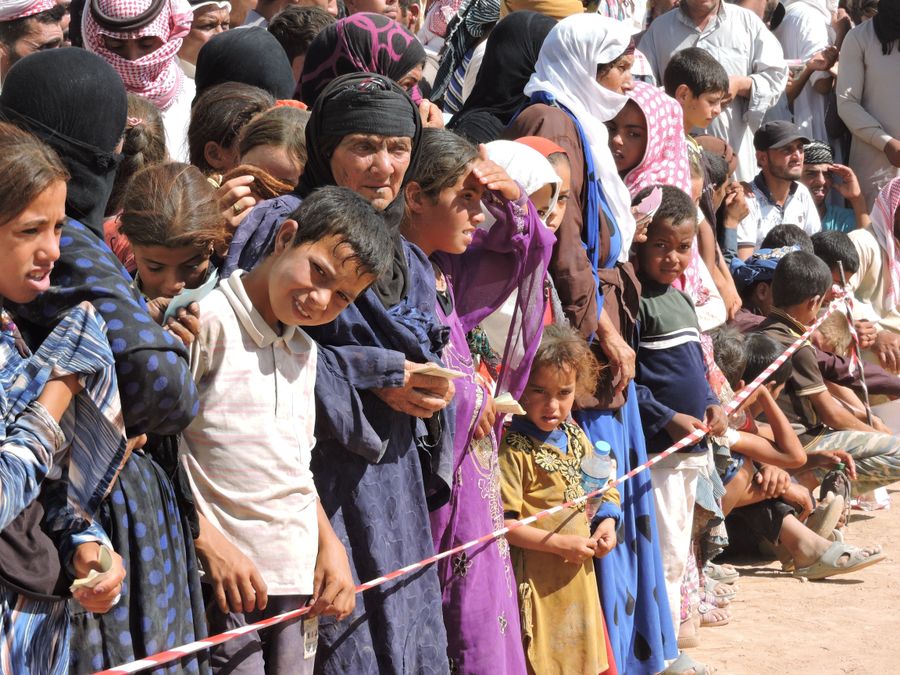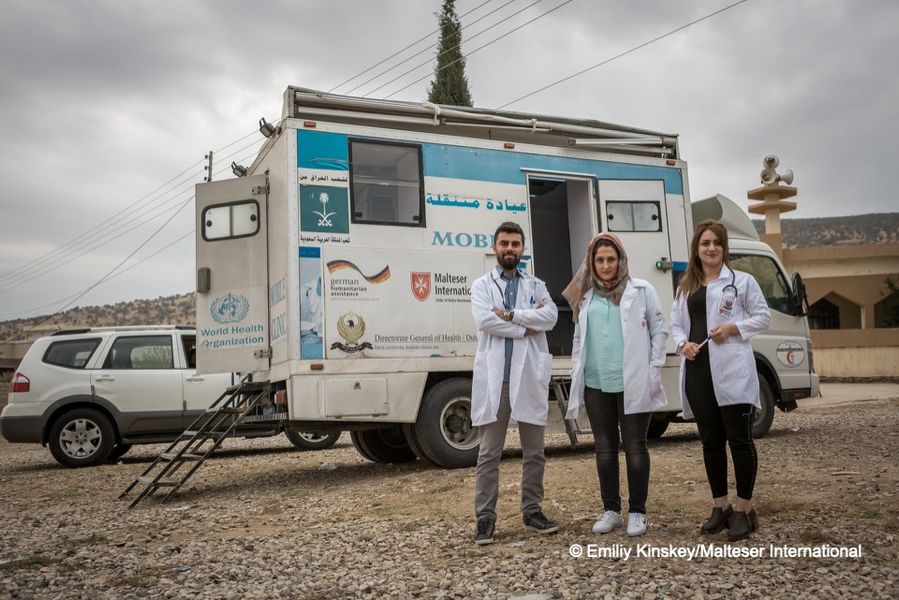Global goals, local solutions
More than before in recent history, global dynamics are driven by insecurity, forced migration, economic inequality, climate change and increasing natural hazards. The international aid system is responding with an array of possible solutions, yet impact remains largely superficial. While there is a strong demand for them, the complexity and ambition of global strategies are often lost in a system characterized by lack of funding and absence of political will. Malteser International is itself part of this complex aid system, which is why we have set about the task of redefining our contributions to international aid by working with excellence, sincerity, and empathy.
In 2018, 68.5 million people around the world were fleeing from their homes – that is more than the population of France. The reasons for this development are in many cases the result of a complex interplay between political, social, economic and ecological factors. Millions of people are on the run from persecution because of their religion, ethnic background, political or sexual orientation, while others have been displaced by catastrophic drought and flooding. Addressing the causes of forced displacement requires the setting in place a sound political framework and strong human rights policies. As humanitarian actors, we can only serve as catalysts at best because our core mandate remains the alleviation of human suffering.

As local as possible . . .
Developing nations host over 80 per cent of the world’s refugees and almost all internally displaced persons live in the poorest countries. There is no denying the link between poverty and displacement. While national governments shouldn’t have to bear the sole responsibility of providing long-term prospects for people on the run, they have a special role to play. by combining national action and international support with effective economic, social, environmental and security policies.
It is also the case that key responders to displacement include a wide range of actors from local faith communities, civil society organizations, regional and national institutions. In recent years – and especially since the 2016 World Humanitarian Summit in Istanbul – the ‘localization of aid’ has become prominent in discussions about responses to current humanitarian challenges. Working with and strengthening local capacities has risen high on Malteser International’s agenda and is a core part of our strategy. In most of our project countries, it is the local partner organizations that make our assistance possible and translate it into concrete action. These actors are often best placed to provide timely, cost-effective and appropriate humanitarian assistance.
"There is no getting around fostering self-determination and autonomy”

Despite this much articulated fact, grassroots organizations are far from being accorded the status, freedom of choice, or funding to which they should be entitled. There remains a huge divide along the lines of power and finances. At times, local actors reach the limits of their capacity and are incapable of acting neutrally in conflict situations, there is nonetheless no getting around localization, i.e. fostering self-determination and autonomy. By ensuring that solutions to problems are proffered by the people closest to the issues on the ground, and only intervening when absolutely necessary, we stay true to our commitment to subsidiarity.
We will continue to advocate more self-determination and autonomy for people on the ground. The future will see us transfer processes to our project locations and ensure that those who benefit from our work not only have a say, but also make decisions.
. . . as international as necessary
Sometimes crises or natural disasters can be so huge that even countries with good response plans and crisis intervention mechanisms are unable to cope on their own. In these cases, efforts from international experts to assist local emergency forces can help ease human suffering. We are constantly expanding our emergency response capabilities and developing centralized and regional frameworks, contributing to preparedness efforts of national actors. In cooperation with the German Federal Foreign Office, we have launched the first cross-border program in Africa to make emergency aid in particularly vulnerable regions more efficient in the long term.
At the same time, we are increasingly involved in collaborative efforts with the United Nations. In times of ever more complex crises, the coordination and cooperation of all humanitarian aid actors will become increasingly important. This also includes firmly consolidating existing partnerships and alliances with local institutions in order to be able to react quickly in the event of a crisis. The better the coordination mechanisms work, the more efficient the aid for people in need.
Rethinking new ways for national and internation cooperation
To increase our positive impact for the future, we will continue to look for new ways and partnerships for our work. In Uganda we launched a pilot project in cooperation with a social enterprise, which aims to not only reduce the environmental impact of the region through the use of carbon-neutral construction materials, but also to offer future prospects and jobs to refugees and youths in Uganda.
More than 90 percent of the people we work with are affected by economic fragility, violent conflicts, natural disasters, and structural problems. Therefore, of the 17 goals of 2030 Agenda for Sustainable Development, we are most committed to ending poverty and hunger in all their manifestations, promoting a peaceful and inclusive society, ensuring good health and well-being as well as clean water and sanitation for all. Our efforts in long-term development are guided by these goals. While the current global situation is a difficult one, it presents us with a window of opportunity to secure the gains of the past years and reach towards further success in the years to come. Our global strategy will undergo developments to help us adapt to the changing role of international non-governmental organizations and meet the challenges of a rapidly changing aid landscape. I personally look forward to these challenges with the certainty that we at Malteser International will do everything in our power to continue to put people in need at the center of our work.
- Taken from the Malteser International Annual Report 2018








